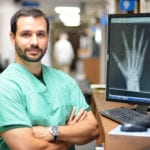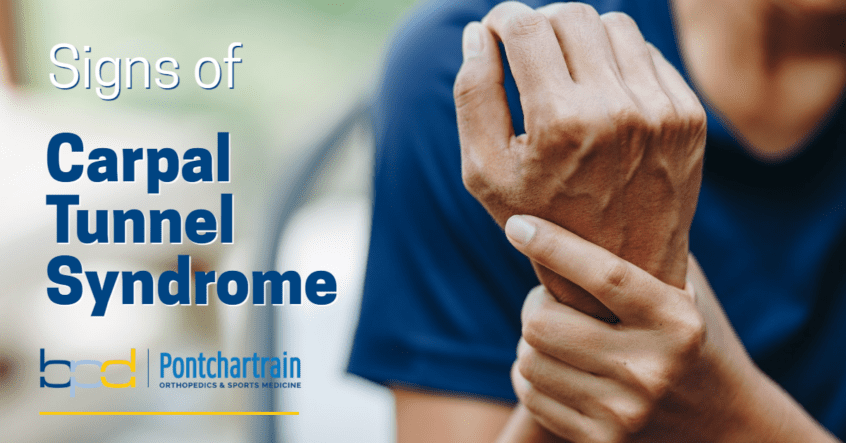
Carpal tunnel syndrome (CTS) affects as many as a third of all workers in the U.S., in particular those with jobs requiring repetitive hand movements. A wide range of conditions can cause general hand and wrist pain, or as Dr. Donnelly discussed in his blog post, even seasonal hand pain. In today's post, learn the warning signs of carpal tunnel syndrome and why you should not ignore them.
What is Carpal Tunnel Syndrome?
Carpal Tunnel Syndrome (CTS) is a condition where the median nerve, running from the forearm into the palm, becomes compressed at the wrist within the carpal tunnel. This narrow passageway, surrounded by bones and ligaments, may narrow due to repetitive hand and wrist movements, leading to pain, tingling, and numbness in the hand and fingers. Commonly associated with activities like typing or repetitive manual work, CTS can also result from underlying medical conditions.
Top 5 Symptoms of Carpal Tunnel Syndrome
Carpal Tunnel Syndrome (CTS) manifests through various symptoms, with the top five being:
- Hand Numbness and Tingling: Individuals with CTS often experience numbness and tingling, particularly in the thumb, index, middle, and ring fingers. This sensation can extend up the arm.
- Pain and Discomfort: When your hand or wrist hurts persistently. This discomfort may radiate from the wrist up the arm or down into the fingers. It often worsens during activities that involve repetitive hand movements.
- Weakness in the Hand: Weakening grip strength is a notable CTS symptom. Individuals may struggle to grasp small objects or perform tasks that require fine motor skills. This weakness can impact daily activities.
- Burning Sensation: Some people with CTS report a burning sensation in their fingers or hand. This discomfort can be exacerbated during periods of repetitive hand use or when the wrist is flexed for an extended time.
- Nighttime Symptoms: CTS symptoms frequently intensify at night. Many individuals wake up with pain, tingling, or numbness in their hands, prompting them to shake or massage their hands for relief.
If these symptoms persist, it's crucial to consult a healthcare professional for a proper diagnosis and appropriate management, which may include lifestyle modifications, splinting, medications, or, in severe cases, surgical intervention.
How is CTS Diagnosed?
CTS Treatment Options
- Nonsurgical Treatment of Carpal Tunnel Syndrome: Nonsurgical options for Carpal Tunnel Syndrome include wearing wrist splints, modifying activities, using anti-inflammatory medications, undergoing physical therapy, and receiving corticosteroid injections. These measures aim to alleviate symptoms and improve hand function without surgical intervention.
- Surgical Treatment of Carpal Tunnel Syndrome: Surgical options for Carpal Tunnel Syndrome include carpal tunnel release procedures. These can be performed using traditional open Carpal Tunnel Release surgery or minimally invasive endoscopic techniques. The goal is to alleviate pressure on the median nerve, reducing symptoms.
Why See a Specialist?
The reason you should visit an orthopedic hand specialist for carpal tunnel is because they have the expertise and knowledge necessary to adequately examine, diagnose, and treat hand and wrist conditions. A primary care physician (PCP) treats many different common health conditions, such as the common cold or flu. However, a PCP may not be as adept at fully, properly addressing serious conditions like carpal tunnel syndrome.
The good news is CTS surgery has a remarkably high success rate of more than 90 percent. Many symptoms are quickly relieved, including tingling and numbness. Recovery doesn’t take long, either: The bandage covering your stitches can be removed in just a few days. The following carpal tunnel syndrome questions discuss the long term prognosis of CTS.
Have Questions About CTS?
About Dr. Brandon P. Donnelly, MD
 Dr. Brandon P. Donnelly is a board certified hand surgeon with Pontchartrain Orthopedics & Sports Medicine. Dr. Donnelly completed his hand and microsurgery fellowship at the prestigious Philadelphia Hand to Shoulder Center. Dr. Donnelly treats all ages of patients in the greater New Orleans area for hand, wrist, and elbow conditions.
Dr. Brandon P. Donnelly is a board certified hand surgeon with Pontchartrain Orthopedics & Sports Medicine. Dr. Donnelly completed his hand and microsurgery fellowship at the prestigious Philadelphia Hand to Shoulder Center. Dr. Donnelly treats all ages of patients in the greater New Orleans area for hand, wrist, and elbow conditions.
This site is not intended to and does not provide medical advice, professional diagnosis, opinion, treatment or services to you or to any other individual. Through this website and links to other websites, Brandon P. Donnelly, MD provides general information for educational purposes only. The content provided in this website and links, is not a substitute for medical care or treatment. You should not use this information in place of a consultation or the advice of your healthcare provider. Brandon P. Donnelly, MD is not liable or responsible for any advice, course of treatment, diagnosis or any other information, services or product you obtain through this site.

